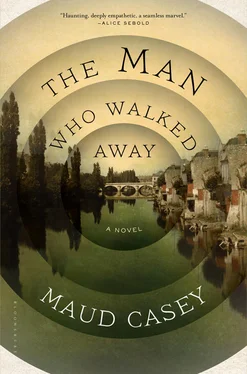Samuel would be relieved to be something as solid as a ghost. He shivers by the fire because this is his fault for taking off the coat that holds everything together. The shadows have come, and the Director and the Doctor and Nurse Anne and Henri and Claude, running around the common room, try to gather the shadows before they swallow everyone whole, but they are too late. Samuel will dissolve into that awful sound that is strangely familiar, and then that awful, familiar sound is in front of him, taking the shape of the veteran, and it is reaching for the trowel the Director laid down by the hearth in order to stoke the fire.
If only the veteran could not think about what he is thinking, but he is beyond thinking or not thinking. If only he could dig a hole deep enough and crawl inside, tunnel into it, but there is no hole that is not filled with his decaying brother. The veteran is dead too but not dead enough. He only wants to feel something else; he only wants to feel nothing. When he drives the trowel in, it works as he hoped it might. He does not think, at last he does not think. He does not think, for example, Am I dying? He does not think, Is this all? After all of that terrible life? Is this it?
After it is over, Henri and Claude will mop up the blood and all that will remain to remind them of this day will be three stubborn coin-sized stains. That, and the Director’s hand, the one that laid the trowel down on the hearth, which will develop a small but permanent tremor. The Director, who had always been so careful, but he ignored Nurse Anne’s counsel to keep a stricter eye on the veteran. Beauty is an answer to anguish, and years later he will still believe this to be true, but it was he who left the trowel unattended — how could he have left the trowel unattended? No one ever will ever ask him, not directly (Nurse Anne’s pitying silence is far worse), but he will never stop asking himself; no answer will satisfy.
And the door continues to bang open and shut, open and shut, open and shut with the wind, keeping time with the weeping and the shouting as the veteran topples over, the trowel embedded in his thigh. Open and shut, open and shut, Albert listens from his room, where he fled as soon as Marian turned on him, pointing, blaming him for the sound he hoped never to hear again, a sound that causes him to sweat and tremble, to feel so dizzy he might fall down, filling him with that urge to walk, so powerful he is afraid he will disappear and wake up in some other place, in some other time. So powerful he will disappear and never wake up at all. He pulls the sheet from his bed and begins to twist it into a makeshift rope.
That night began like any other. The story of the prince who wanted to see the world hovered in the cottage’s living room as his father carried him, his sweating and trembling son, to the bed, swaddling his wrists in strips of cotton cloth before binding them with rope. “Is it too tight?” as he tied him to the bed. The same unspoken questions in the worried lines on his face. What will become of you, Albert? What will happen when I’m gone? Who will bring you back? Albert thrashed in his bed, as he did each night. But then, instead of his father’s weeping, there was a terrible sound that had nothing to do with Albert at all. He wanted so badly for it to be the wind, but it was an animal sound, a roar of protest. Only later would he understand the roar was his father’s. He writhed and writhed against the bindings, weakened from all the nights of thrashing, until they frayed enough for him to break loose, but by then it was too late. By the time he reached the living room, the protest was over. His father’s pipe lay on the floor near the chairs where Albert and his father sat each night, the tobacco fallen out in the shape of the bowl. Next to it, the beautiful waxy swirls of his father’s cheek turned up to the early light.
Falling to the floor beside his father’s body, he pressed his cheek against the waxy swirls, not waxy at all but soft and smooth. As the streets began to rattle and hum with morning, Albert’s tears ran into the velvety swirls on his father’s cold face.
He was there in the cottage with his father and then he wasn’t, pushing his way past people and horses, the touch of their flesh cutting and cold as glass. He did not remember crossing the Pont de Pierre, but then he was walking in the countryside on the other side of the bridge; he discovered himself barefoot in a river, his feet numb with cold, his face scratched by holly branches, his fist full of nettles, and he squeezed their poison. To keep from being afraid, he said, Fascinating! Magnificent! Yet another escapade! He walked until the flames his father told him blazed underneath the surface of the earth rose through the soles of his feet and he thought, I will walk until the flames rise up and burn me alive.
But as often as he implored them to, they would not oblige.
There is only silence now. The door no longer bangs open and shut, open and shut, and the shouting has stopped, but Albert has lost his place in time. It doesn’t care for him, a citizen of nowhere, of nothing. He is a shadow. Shadow ring, shadow ring. It is all shadow.
“Albert?” A voice begins to take shape in the darkness. “Albert?”
The sheet he has used to fasten his arm to the leg of the bed still holds.
“Albert, what have you done?” Albert inhales the Doctor’s warm breath as he sighs. “Oh, Albert,” bending town to untie his arm, his one swan wing.
“You are still here,” the Doctor whispers.
For a moment it seems possible that Albert never left. Perhaps when he reached the Pont de Pierre he didn’t cross it. Perhaps he didn’t walk into the countryside until he woke to discover himself standing in the river wishing to disappear. Maybe he turned back. Maybe he walked the winding streets back to the cottage and lifted his father’s body from the floor the way his father had lifted Albert’s body, bringing him back again and again and again and again. Maybe he carried his father’s body to his bed and laid him down as any grateful son would. This is the lost life he wishes for most of all, the one in which he never walked away.
A fox scampers along the rough-hewn path to the creek, veering off into the blackberry bushes at the sound of a snapping twig; once it is quiet, the fox returns to the path, padding down to the creek to drink, its red-brown coat dappled by the light through the trees. It is unaware that it is of its hour or that up the hill, across from the small stone church, in the long shadow of the cathedral, the careful balance of the asylum had gone awry and is now being restored.
“We will get you a much better coat,” Henri says to Samuel, who is wrapped in a blanket. Claude used Samuel’s coat to stanch the veteran’s bleeding. “That coat was much too big anyway.”
The Director, having tended to the veteran’s wound, having given him a bromide, having asked Claude to put him to bed and watch over him, has shut himself in a linen closet to weep for his fellow veteran, who will recover from this wound, which was not grave, but who will never recover from the war. The Director takes this moment but then he will pull himself back together, in order to lead the patients to the creek for the quiet contemplation of nature and beauty, because that is still the point, isn’t it? Perhaps they will see the fox again, he thinks, but the fox is long gone.
Marian has become convinced that it is not Albert but the veteran who contains the thieving sun; she perches on her bench in the courtyard to see what the flowers might tell her. Walter stands nearby, having decided he doesn’t care if Marian is real or not. She is real enough.
Читать дальше












